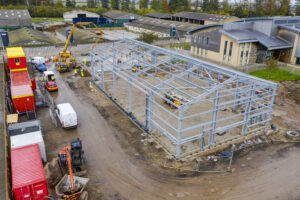Lindum has started work on two new college buildings which will teach precision farming and focus on reducing the environmental impact of agriculture.
Bishop Burton College is investing £2.7m in new Institute of Technology buildings in Yorkshire and Lincolnshire.
Once complete, they will offer cutting-edge agricultural education which will specialise in delivering higher-level technical skills to improve productivity, reduce skills gaps and support industry growth.
The centres are being built by Lindum at Bishop Burton’s campuses in Beverley and Riseholme.
The £1.7 million Yorkshire and Humber Institute of Technology will provide students with the skills to utilise technology and big data to reduce the environmental impact of agriculture.

It will offer a range of high-level technical qualifications, focusing on precision farming systems which can transform food production techniques whilst reducing emissions, pollution, waste and soil erosion. It will be dedicated to the most forward-looking agricultural systems, including satellite technology.
Meanwhile, the Lincolnshire Institute of Technology at Riseholme College will focus on precision agriculture and agri-food. Its programmes will provide students, and the agricultural industry, with the skills needed to utilise technology to its full potential.
Over £1 million is being invested at Riseholme to develop new classrooms and dedicated workspaces.

Bill Meredith, Chief Executive and Principal of the colleges, said: “We are really pleased with the progress so far on the build of these fantastic facilities on both the Bishop Burton and Riseholme campuses.
“Once the Institute of Technology buildings are completed next year they will become a key resource for the development of higher level precision agriculture skills from which our students will benefit from for years to come.
“Precision farming involves smarter and more precise use of farm inputs and potentially improved yields, because you are only placing the inputs exactly where they are required. This also has the potential to help reduce our carbon footprint, not just because of the precise applications, but because it also lends itself to more sustainable methods of production, for example minimal cultivation techniques and a more integrated farm management system.
“This will cut our carbon output bringing us one step closer to achieving our aims to make our college farm carbon net zero by 2030.”
The developments are among a draft of projects across the country which are being funded by the Government’s £170m Institute of Technology programme.
IoTs are collaborations between further education providers, universities and employers. They will specialise in delivering higher technical education (at Levels 4 and 5) with a focus on STEM (science, technology, engineering and mathematics) subjects.
Bishop Burton worked with a consortium of other education providers and businesses in the Lincolnshire and Humber region to bid for money to build the two centres.
The Lincolnshire centre is being built by Lindum’s Lincoln-based construction team while the Beverley centre is being built by Lindum’s York division. The contracts were awarded to Lindum through separate tender processes.
Lindum director Freddie Chambers said: “We are really pleased to be involved in the development of these centres, which will be crucial to the agricultural economy and the food sector in future. We work very closely with these industries and understand their need for innovation and development in world-class facilities.
“From a construction perspective, both sites are in busy college environments and require exceptionally high standards of health & safety and communication. We are working with the colleges to ensure we keep all pupils, staff and animals safe while building work is in place.
“We are also doing what we can to involve the college communities and in Beverley, for example, we have hosted visits from the college’s bricklaying students who have been learning their craft in a real construction environment.”





